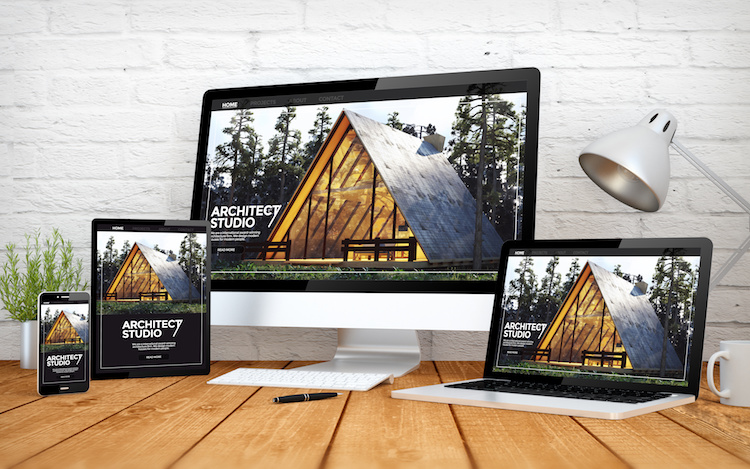13 Website Tips from Digital Marketing Pros

Some small business owners think throwing up a bare-bones website or Facebook page is “good enough” when it comes to online marketing.
But an effective website — one that’s easy to navigate, nice to look at, and answers your prospective customer’s questions — is a huge part of building your business and establishing trust. It’s your brand’s online home!
We asked industry experts for their top website tips, including how to deliver top-notch content and improve performance to attract more visitors.
1. Find your “good enough.”
“Don’t expect perfection from day 1. Modern websites, like businesses themselves, should evolve based on changing user expectations, business objectives, and industry standards.
It’s important to decide what’s “good enough” before targeting perfection. You can spend countless dollars, hours, and days trying to fine-tune a new website before launch, only to find out that the latest in design and technology trends are moving faster than you are.”
– Jordan Brannon, President & COO, Coalition Technologies
2. Ensure it’s mobile-friendly.
“Make sure your website design is mobile-responsive because most users today are viewing websites on smartphones and tablets. If it isn’t responsive, users will have a different (and worse) experience depending on which device they use.
Bonus: Google rewards sites that are responsive by ranking them higher in their search engine results.”
– Carlos Montalvo, Web Developer, GWP Inc. Advertising
3. Focus on the important questions.
“A company website should clearly communicate the purpose of the company and its value to the visitor. Website design often veers off course when the goals revolve around “what’s cool,” “what I like,” or “what they (another company or competitor) are doing.”
Instead, focus on questions like, “Who’s our customer? How might they navigate through this information? What do we provide that’s unique?”
– Andrew Woods, Co-Founder, Duckpin Design
4. Foolproof it.
“Put navigation and site efficiency above aesthetics. Aesthetics are important, but a confusing or glitchy site (no matter how beautiful) is pointless.”
– Shawn Rubel, Founder & CEO, Vecteezy
5. Make time to plan.
“Start your website design process by looking at leading sites in your industry to see how their information is organized.
If you’re looking to be the best fashion blog, look at other successful fashion blogs for ideas on how your site should be set up. If you’re an ecommerce site, look at established sites like Zappos.
Next, create a wireframe, blueprinting each individual page and defining how each of those pages will connect and interact with one another. Those who fail to plan, plan to fail. A wireframe, however simple, is a necessary prerequisite to developing your company’s website.”
– Mike Sims, CEO, ThinkLions

6. Cover the need-to-knows.
“The most important thing to keep in mind when designing a new website is what your audience does and doesn’t know.
Too many small businesses have websites that don’t include their physical address, hours of operation, full list of services, service area, or pricing policies because they make too many assumptions about what their customers already know.”
– Joe Goldstein, Operations Manager, Contractor Calls
7. Keep it simple.
“Simplicity and minimalism are keys to a good website or landing page for your customers, whether its to help educate visitors on your services or to purchase products.
Think of it like designing a living room: colors need to work together (no clashing!) and you need to minimize the amount of content you’re presenting to avoid looking like a messy, early-2000s template.”
– Dimitri Villanueva, President, MYLABFAX
8. Focus on one objective per page.
“Keeping your webpage clean with few distractions will help the viewer flow through the content without being uninterested and distracted.
To do this, you should keep each page focused on one specific objective. Use spacing through your page to keep your content organized and easy to follow.
Another aspect to consider when creating and maintaining your webpage is to keep the information up to date, whether that’s a phone number change, an updated blog post, or other pieces of content. Your viewers want the most recent and accurate information.”
– Chris Madden, Founder, Matchnode
9. Make it action-oriented.
“Your website should put your customers first and your company second. Talk about your customers’ problems, pain points, and needs, and present them with a solution in a way that clearly highlights the end results and benefits of what your product or service brings to them.
You can also give away freebies like ebooks, infographics, guides, catalogues, checklists, coupons, or limited offers — put it behind an opt-in form, and you’ll have a lead that will teach you what your prospects are looking for or need help with most.
Last but not least, use calls to action! Believe it or not, people need to be told what to do, directed where to go, and be told what step they should take next. Make this easy for them with big buttons, arrows, and pretty pictures that show them the way.”
– Karina Singer, Director, On The Maps
9. Design for your business type.
“When designing an ecommerce website, focus on the exploration and checkout process, because reducing friction can lead to more completed purchases and happier customers. Keep language clear and concise, and make sure interactions follow patterns the user expects.
When designing a blog, keep in mind how the user will be consuming the content. For example, annoying ads can interrupt the reading experience and drive users away. Consider a comment system, and try cross-posting to third party publication services like Medium.”
– Ben Plum, Director of Design Development, Warschawski
10. Ensure it’s reader friendly.
“Use fonts that are easy for your visitors to read – there’s nothing more irritating to a consumer who’s trying to navigate around a website than not being able to understand the written content. Select colors and fonts that are in line with your brand, but ensure they’re simple and clear.
It’s also a good idea to ensure you have a navigation bar present on all the pages on your site. This will allow your visitors to easily navigate their way around and find their way back to the homepage.
Don’t include too much copy or media; overloading your website with images or videos will only clutter the layout and make your pages take much longer to load.”
– Steve Pritchard, Managing Director, ItWorks
11. Keep basic SEO in mind.
“Keyword placement is really important when it comes to your website ranking well in search engines. I have a rule that I place my primary keyword in the title, the URL, the first 100 words, headings and subheadings, and then again in the last 100 words of my content, which helps search engines to index my content.
I also like to make sure my primary keyword is 3-4 words long, which is a long-tail keyword. Using this helps people to find exactly what they need, and it’s more specific and less broad than a one-word keyword.
I find that I get more traffic from being more specific and using keywords that my ideal clients would search when they need help.”
– Lizzie Moult, Business Consultant & Online Marketer, lizziemoult.com
12. Always be updating.
“One of the best analogies I’ve heard is ‘treat your website like a garden.’ If a garden isn’t maintained, it can get out of control quickly and, in some cases, die.
You need to treat your website the same way, which means you need to make sure you’re always creating fresh content by publishing your blog on a regular schedule, introducing new forms of content such as vlogging, updating your FAQ section, adding in new testimonials, and retiring old ones.
You can also go back and rework page titles (and even on-page content) that didn’t perform well in Google to try and make it more optimized. Check your main pages for outdated information and references — what might have been relevant a year ago may no longer be.
Remember: your customers may change over time, which means that your copy needs to change with them.”
– Mark Hayes, Chief Marketing Officer, Rocketshp
13. Provide value.
“Publish relevant content regularly — create a blog content plan based on hot topics researched using a tool like BuzzSumo. Then, track your numbers. Pay attention to what your readers are consuming. Use Google Analytics to see what they’re reading and write more about those topics.
When you pay attention to what your readers want and give them more of it via posts, products, and services, you’ll not only keep your website relevant, you’ll able to build a successful business.”
– Kristen Poborsky, Marketing Strategy + Implementation, kristenpoborsky.com
Ready to make a website? Check out our in-depth guide to doing it on your own.